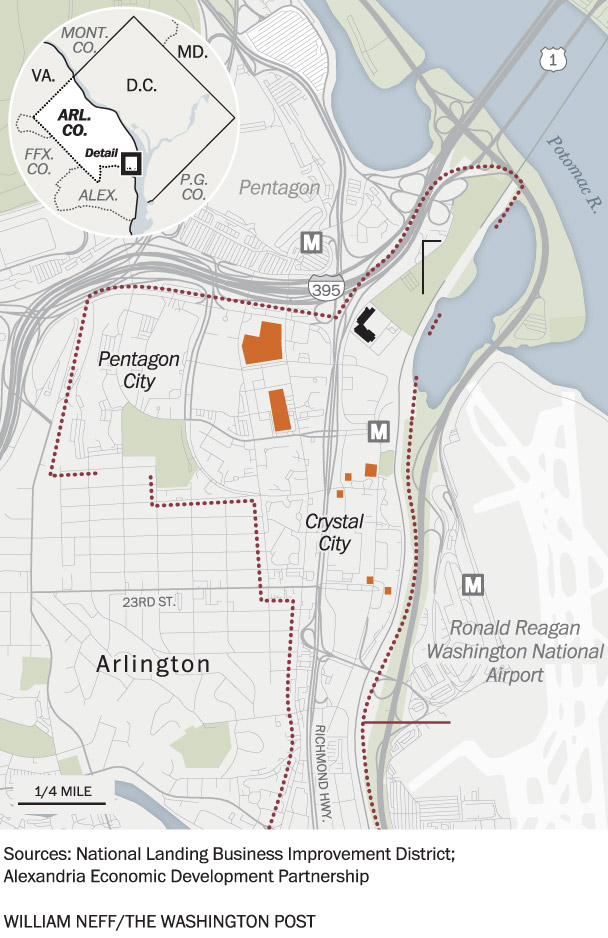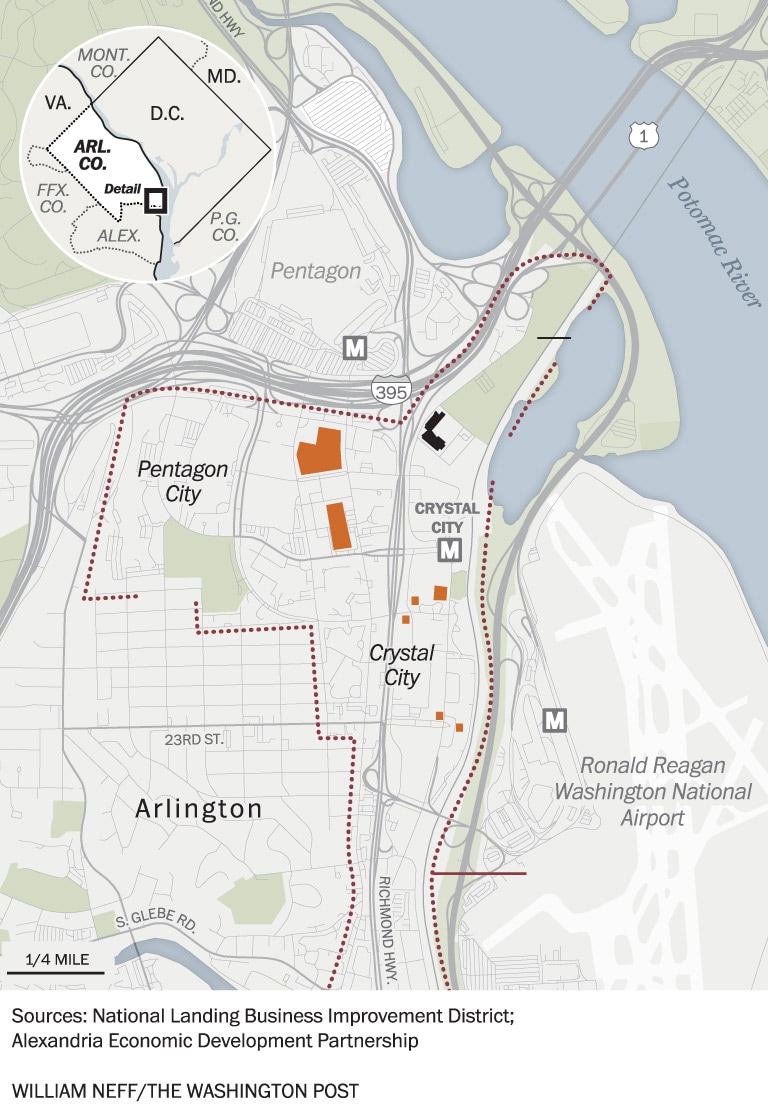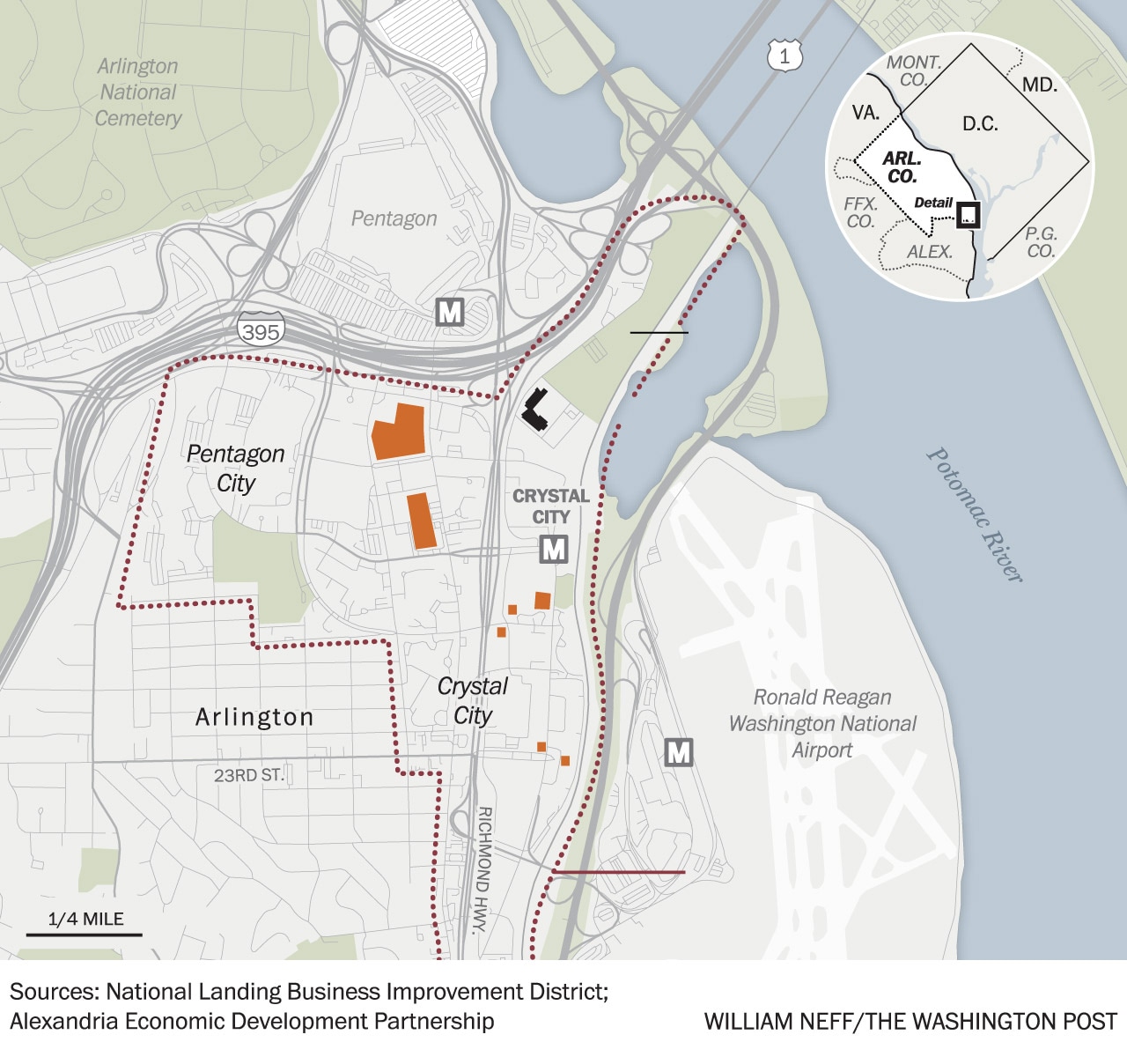When Amazon announced it would be bringing its second headquarters to Arlington, local officials wasted no time pitching it as a chance to build something much bigger: This corner of Northern Virginia, they said, could transform into a dense, urban technology hub — a kind of eastern outpost for Silicon Valley.
Boeing’s move to Arlington pushes ‘tech hub’ vision closer to reality
More than three years later, that vision seems like it’s no longer just an idea.
For boosters of the area now dubbed “National Landing,” the leaked announcement last week that Boeing would be moving its own headquarters to Arlington shows that a neighborhood once known solely as the home of the Pentagon is well on its way to becoming a regional “innovation district.”
And for economic development experts, the aerospace giant’s move from Chicago also underscores the success of Virginia’s economic development strategy, which has focused on luring companies by growing and diversifying the state’s tech workforce.
But if Boeing’s decision signals that more companies could soon be coming to the area, they say, it’s also a warning sign: All the pain points associated with explosive growth in Seattle or the San Francisco Bay area — sky-high housing prices, chronically congested roads, a widening rift between the rich and the poor — may become even more acute in a wealthy county that already suffers from similar woes.
Boeing’s move to Arlington “puts an even greater premium on the work the region has been trying to do to build its digital talent pipeline,” said Amy Liu, a vice president at the Brookings Institution and director of its Metropolitan Policy Program.
“But we have to be very intentional about the people who will benefit from this growth,” Liu added. “Otherwise, we are going to further widen inequities in this region.”
Besides Amazon’s new offices, the “National Landing” corridor is anchored around a graduate engineering campus that Virginia Tech is building in Alexandria’s Potomac Yard neighborhood. The 3.5-acre facility is being funded in part by $545 million from Virginia state coffers, in addition to $50 million from Boeing.
The weapons and jet manufacturer already has a 400-person office in Arlington’s Crystal City neighborhood, and it said it has no immediate plans to expand its footprint or shift over employees from Chicago aside from a few top executives.
Terry Clower, a public policy professor at George Mason University’s Schar School of Policy and Government and the director of its Center for Regional Analysis, said that Boeing’s decision nonetheless gives National Landing a good set of “bragging rights.”
Boeing has also said it will build a research and technology hub to focus on innovating in cybersecurity, quantum sciences and other fields, though it has so far offered few details on where that hub will go or what it might look like.
“If you put that [Boeing] on top of the Amazon HQ2 announcement and the presence of other significant tech sector employers, it casts the message that this place is great for tech businesses,” Clower said. (Amazon founder Jeff Bezos owns The Washington Post.)
As local officials seek to compete with other commercial centers around the D.C. region, as well as other “innovation districts” in the Northeast, such as Philadelphia’s University City or Kendall Square in Cambridge, Mass., that message is perfectly in tune with the booming vision they are pushing for National Landing.
According to a market impact study published in April, the area has 8 million square feet of new office space in the pipeline, with 9,000 new jobs in addition to those being created by Amazon. AT&T has rolled out plans to build out a 5G network meant to turn the neighborhood into a “smart city-at scale.”
What that means for the region as a whole, though, depends largely on whom you ask.
Amazon jerseys on Boeing Field
While Boeing has had a presence in Arlington since it picked up military contracts during World War I, the company moved its defense operations to Crystal City just as the county was facing a kind of existential crisis.
Upon the 2005 recommendation of a federal panel, 17,000 military and defense contractors began moving out of the area. By about a decade later, the process known as Base Realignment and Closure (BRAC) had emptied out about one-fifth of the office space in the neighborhood.
Boeing’s arrival at its current offices on Long Bridge Drive in 2016, then, served as a kind of counterpoint to that exodus.
“They have been a pretty steadfast partner in Crystal City during a very challenging time for the area,” said Arlington County Board Chair Katie Cristol (D). “We were really concerned about Crystal City being hollowed out, but Boeing was willing to make an investment.”
Unlike many of its more suburban neighbors, Arlington depends on commercial properties for about half of its tax revenue. Keeping office workers around was and still is essential to supporting county services without significantly raising taxes on homeowners.
Yet, Cristol also pointed out that the aerospace giant’s contributions have gone beyond its taxes. In 2019, for instance, the company donated $10 million to the county to finance the construction and operation of a new aquatics center up the street, also fronting access fees for active duty military and their families.
In exchange, county officials named some of the park space in between the two structures after the aerospace company.

Boeing Fields
at Long Bridge
Park
Boeing offices
Amazon offices
National
Landing

Boeing Fields
at Long Bridge
Park
Boeing offices
Amazon offices
National
Landing

Boeing Fields
at Long Bridge Park
Boeing offices
Amazon offices
National
Landing
Today, the Boeing Fields at Long Bridge Park are a hub for after-school activity. On one recent Tuesday evening, youth travel soccer teams ran drills on the turf as parents watched their toddlers on futuristic, rubber-floored areas to the side.
Noemi Vargas, 49, had brought her sons to scooter around on the sidewalk as she scrolled through her phone, sitting on a bench across the street from Boeing’s glass-and-steel offices.
The family had been making the short walk over from Pentagon City for years, but Vargas said she had no idea that the park was in part named after the company.
“If it’s expensive now, it’s going to be impossible with Boeing,” Vargas, a stay-at-home mom, said in Spanish. “Not everyone is going to be able to stay in this area … But I guess it’s a good thing if they do bring jobs.”
A few yards away, Sebastian Edmunds stood on the sidelines of the soccer turf, chatting in a circle of parents as their daughters’ travel team dribbled balls up and down a pitch named after Boeing. One half of the team wore gray jerseys emblazoned on the back with Amazon logos.
As a real estate agent, the Falls Church resident said he’s already seen how the presence of the e-retail giant has led to skyrocketing home values across Northern Virginia in the region’s white-hot real estate market. As a parent, he added, the presence of these tech companies represents greater opportunity for his kids.
“When you have Amazon here, it’s very easy for a child to imagine going into tech,” Edmunds said, looking out at the scrimmage. “My daughter can say, ‘I’ll go to college and then come back and work for Boeing.’ ”
A ‘clustering effect’
Ask any economic development official in Northern Virginia, and they are bound to share Edmunds’s conviction. Their plans to grow and develop a pipeline of young, diverse tech workers are deeply intertwined with their push to attract companies to National Landing and turn it into a tech hub.
“You can’t have a technology company right now without talent,” said Tracy Sayegh Gabriel, executive director of the National Landing Business Improvement District. “The labor market is very tight, it’s fiercely competitive. Having the proximity of that tech talent is essential to operations.”
When Amazon announced a national search for a second North America headquarters, states like New York and Maryland were lambasted for offering billions in tax breaks and direct grants to the tech giant, which earned about $33.4 billion last year.
But Virginia bet on the idea that investing in computer science graduates — and building the pipeline necessary to sustain it — would be more effective in luring Amazon and other major corporate heavyweights.
And it appears to have worked: While Amazon stands to receive $550 million from state coffers, more of Virginia’s dollars are going toward the state’s $1 billion Tech Talent Investment Program. That initiative has set a goal of producing an additional 25,000 new graduates in computer science and related fields over two decades, many of them at Virginia Tech’s Alexandria campus.
Boeing spokesman Connor Greenwood said that Boeing is taking no “economic incentives” from Virginia. Becca Glover, a spokeswoman for Gov. Glenn Youngkin (R), said it is possible that the state will ultimately provide the company with some financial incentives but that they would not be “significant.”
Enrico Moretti, an economist at the University of California, Berkeley who has studied where and why companies locate their operations, said that decisions by both Amazon and Boeing to build headquarters in Arlington bodes well for such an education-centered approach.
While Boeing has not directly addressed why it decided to move its headquarters to Arlington, the D.C. tech labor market is already large, well-educated, and offers a wide variety of specializations, he said. Any effort to widen that pool can only help produce what Moretti says appears to be a “clustering effect” at work with Boeing’s move.
“If you attract a company like Amazon, the labor market becomes more attractive for future companies and future workers,” he said.
Ian Duncan and Laura Vozzella contributed to this report.






